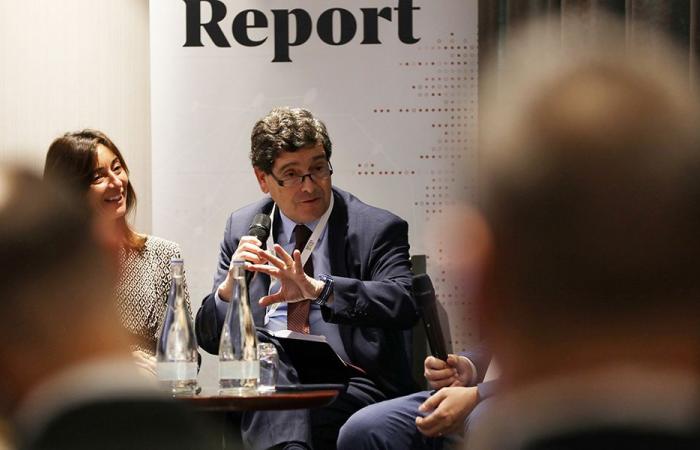“Within the financial system there will be a reduction in people and a profound change in profiles and that is a good thing, because this will satisfy shareholders, but above all it will put these people on the market and it is necessary for people from banking to go to companies”, he argued. the manager.
António Ramalho defended today in Lisbon at the breakfast debate within the scope of the publication of a “Special Report”, which will be on newsstands with Jornal Económico on March 22, that strategy is above talent in the “road map” of the introduction of Intelligence Artificial in banking.
The provision of banking services will see the direct replacement of many functions by the immediate application of artificial intelligence, said António Ramalho.
“Within the financial system there will be a reduction in people and a profound change in profiles and that is a good thing, because this will satisfy shareholders, but above all it will put these people on the market and it is necessary for people from banking to go to companies”, he argued. the manager.
The potential of Artificial Intelligence (AI) in the Banking Sector was the topic of debate. The change in banking professions is one of the consequences of AI.
“Since Basel II, the models for analytically determining the level of risk and the capital allocated to it, which is the core of banking activity, have evolved into processes that are increasingly predictive and increasingly determining the capitalization system, which determined the principle that the more analytical capacity, the more effectively we would identify the likely solution. With the cheaper technology associated with an infinite capacity for reading data, it was normal for this progressive and analytical experience to determine greater predictive capacity, part of it transferred to customers, and part of it transforming banking activity into an activity closer to insurance activity, starting to allocate “upfront” amounts of capital allocated to the risk of each model. Now this would lead to a progressive intervention by the regulator, which with Artificial Intelligence would result in accelerated standardization. So from 2025 onwards we would have banks all doing the same. But this central scenario will not happen because the world is not perfect”, said António Ramalho.
The central areas where AI will be an absolutely decisive component are retail, corporate, processes, risk management and relationship with the regulator, defended chairman of Touro Capital Partners and former CEO of Novobanco.
“We are living in the moment of investment”, said Ramalho, who also added that with the predictive analysis of Machine Learning, any bank today can know the risk of mortgage credit over the next 20 years. “Europe will be the leader, because in retail banking the United States is a weak player”, said the manager.
“The function of banks is to buy and sell risk”, highlighted António Ramalho, who rejects the thesis that banks have the function of transferring savings for investment.
With Machine Learning and Generative AI, banking will lose the advantage of the system’s global vision.
The success of the banking industry lies in reducing costs, argued the former CEO of Novobanco.
Ramalho added that “supply operators are doomed because the market is all about demand, even at the political level”, from the point of view of anticipating demand and adequate response.
The chairman of Touro Capital Partners added that “we are weak in terms of the Internet of Things from the point of view of banking services”, which recalled the obstacle of data protection.
António Ramalho in his speech added that after the pandemic, with the acceleration of digital in banking, “those who lost the most were the ATMs, not the branches”.
On the panel composed of António Ramalho, chairman of Touro Capital Partners and former CEO of Novobanco, Maria António Saldanha, Country Manager at Mastercard, Ricardo Chaves, director of the Center for Excellence in Artificial Intelligence at BPI, Ruben Germano, general director of Revolut in Portugal, Rui Gonçalves, partner responsible for ‘Technology Consulting’ at the consultancy KPMG Portugal discussed AI in the Banking Sector.
One of the conclusions that reached all the participants in the panel that debated AI in the banking sector, is that strategy comes first, as said by Ricardo Chaves, Director of the Center of Excellence in Artificial Intelligence at BPI. There must be a bank strategy on how it wants to adopt AI. Another important thing is that with AI, everything doesn’t happen everywhere at the same time. It’s a journey, it doesn’t happen overnight.
In the questions and answers phase, Mário Trinca, Head of Alvarez & Marsal Portugal, raised the topic of how to make regulators able to adopt in a timely manner all the transformation that is taking place? As an example, he gave deep learning which is a black-box, and “supervisors don’t accept black boxes”, he said.
Machine-learning models can be of various types, some of which are called “black-box”, because they have layers in which it is not possible to explain how the data input results in a certain output. Examples of these types of models are: deep learning models, random forests models, support vector machines.
This term (black box) refers to complex models that, even though they are very effective, do not offer a clear or transparent explanation of how they arrived at a certain result.
António Ramalho, on the other hand, raised the regulatory issue of changing the “fit & proper” (manager assessment) that become decisive.
The manager also recalled that the entire supervision model is based on individual accountability and therefore “we are going to have enormous challenges in relation to the legal archetype of responsibility”. António Ramalho even said that “we run the risk of Artificial Intelligence adapting faster to the regulator than the regulator to AI”.
What value is AI creating for shareholders? It was one of the questions left in the debate, and the answer was the impact on cost reduction and profitability.
António Ramalho was peremptory, “there is a great advantage for shareholders and stakeholders, which is the time-to-marketwhich will accelerate, that is, be faster on the market”.






